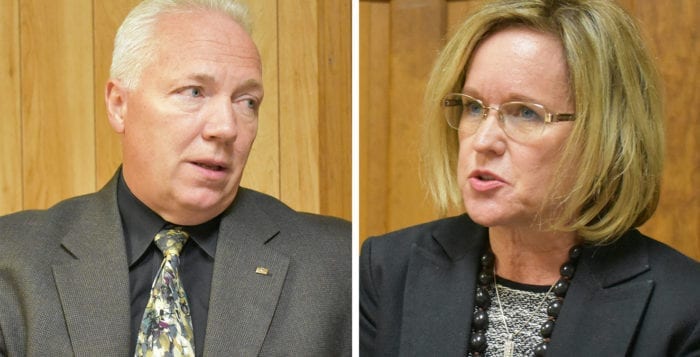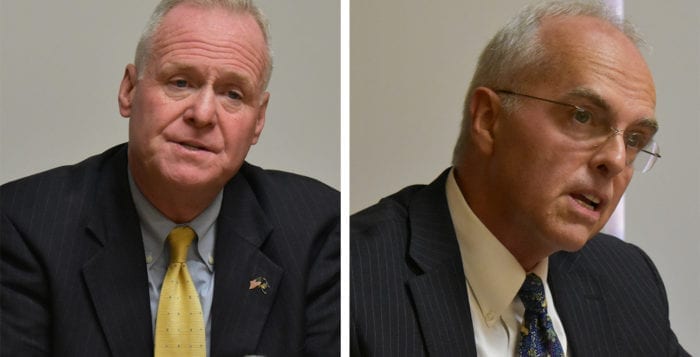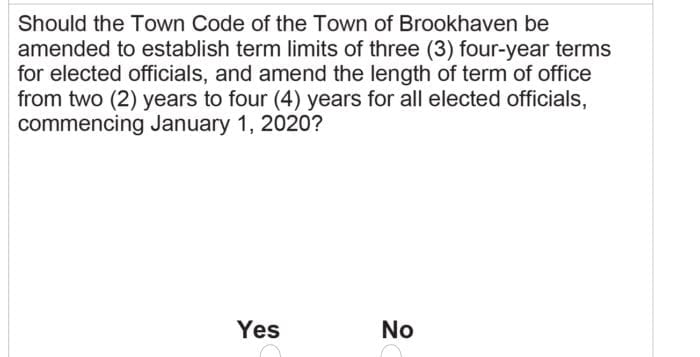The North Shore’s easternmost New York State Assembly District — which juts as far west as Mount Sinai and portions of Port Jefferson — has been represented by an incumbent Republican since 2013, and a first-time candidate for political office is seeking to unseat him.
Assemblyman Anthony Palumbo (R-New Suffolk) was elected in a special election to represent the 2nd District in 2013 and won subsequent races in 2014 and 2016. The 48-year-old practicing lawyer will be challenged this Election Day by 73-year-old Democrat Rona Smith, a newcomer to politics from Greenport with government experience, as she currently serves as the chairwoman of the Housing Advisory Commission for Southold Town.
The candidates sat down for a debate at the TBR News Media in Setauket in October to discuss issues impacting the district.
Health care
The future of health care is at the top of minds for candidates in federal and state races alike this cycle, likely because it’s on the minds of their common constituents. State law can be used in conjunction with federal law regarding health care, meaning the legislative houses of New York’s government will have an opportunity to stabilize health care policy for its residents as the federal Affordable Care Act waits in limbo for a bipartisan solution in Congress.
Democrats in the Assembly have passed a single-payer health care bill — meaning essentially everyone in the state would pay into a pool and everyone would be covered — which has gotten no traction in the state Senate, controlled by Republicans, and appears unlikely ever to become the law.
As the ACA suffers, Palumbo said he would suggest some simple tweaks to improve the current system, rather than implementing a single-payer bill, which he said he believes will be too expensive.
“When you think about the numbers, we’re talking about 900,000 people in New York state are uninsured — they’re between the Medicaid gap and the private insurance gap — that’s 5 percent,” he said. “Not a lot I think, generally speaking.”
He suggested bringing back the Family Health Plus option, a subsidized plan for low-income individuals, which wasn’t available under the ACA, rather than “overhauling” state tax code to afford a single-payer scheme.
“Nothing comes off the shelf perfect,” Smith said of both the ACA and the single-payer bill passed by the Assembly. “They’re not perfect, they’re attempts to try to make sure that everybody — rich, poor, old, young — has health insurance they can depend upon for any health need that comes up. We have got to figure out how to do it.”
Affordability and opportunity
The candidates agreed there are obstacles for people — but especially recent college graduates — for being able to live and prosper both in the district and in the county as a whole. The problem will only be exaggerated going forward by the capping of state and local tax deductions, a component of the new federal tax code bill that will disproportionately impact homeowners in high-tax states like New York.
Smith said she would home in on reducing student loan debt as a means to foster more affordability, in addition to investment in more affordable housing projects for low-income individuals, a plan she said Democrats in the Assembly are already working on.
She said students need access to mandated, objective advice when it comes to borrowing and affording college, rather than just input from for-profit loan collection businesses.
Palumbo said New York’s susceptibility to outward migration can be traced to out-of-control budgeting and spending.
“It’s conservative fiscal values that we need to have,” he said.
He said the Assembly has been working on a solution to mitigate the capping of the SALT deduction at $10,000, though so far the IRS has not blessed any of the fixes.
Infrastructure investment
Investing in projects that could stimulate the local economy is seen as a solution by members of both parties. Currently legislators in New York are gathering funds to study the feasibility of electrifying the Long Island Rail Road east of Huntington on the North Shore line, an idea many have suggested to increase opportunities for people to live and work in the area.
“I think investments in infrastructure always come back in salaries and benefits for people,” Smith said. “It might make housing more accessible.”
She said electrification might be the answer, but the state’s economy could be better served by using the LIRR to ship freight, an idea that would allow farmers and vineyards on the East End to ship fresh products beyond the direct vicinity.
Palumbo said he would go in another direction instead of committing major funds to electrify the LIRR line. He said he would like to see the results of a study examining LIRR ridership to the East End before going down that road and would prefer to see smarter leadership from the Metropolitan Transit Authority when it comes to train schedules and usage.
He also called on school districts to examine ways to scale down spending, which is the largest driver of increasing property taxes.















